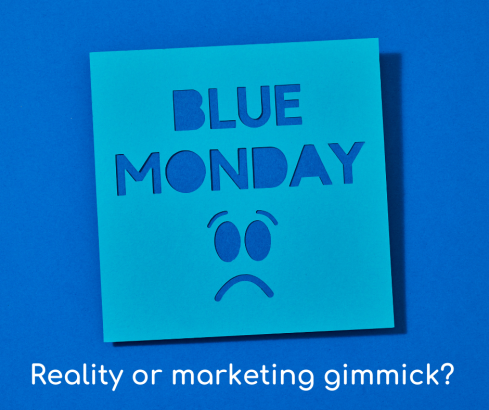Anyone who has experienced difficulties with their mental health knows that mental health most certainly doesn’t keep to a schedule, let alone a single day. The concept of Blue Monday has been around for 20-odd years and still gets an outing every January. So what’s behind it?
The third Monday in January has become known as Blue Monday, allegedly the most depressing day of the year. This year, it falls on Monday 20 January, and will no doubt appear on the social media feeds of individuals, businesses and charities alike.
There's no doubt that January feels like a long month. Christmas and New Year festivities are over, people have probably overspent and overindulged during this period and it’s a helluva long time until pay day! Add to that shorter days and wintery weather and it’s easy to see why many people experience January as a difficult month.

But in reality, Blue Monday is nothing more than a marketing construct that was designed to sell a few more holidays. Back in 2004, Welsh psychologist Dr Cliff Arnall created a formula for the most depressing day of the year to help a travel company sell more holidays. He used factors such as weather, debt, time passed since Christmas, low motivation levels and failing New Year’s resolutions, to create an equation (with no scientific foundation) to legitimise what became known as Blue Monday, which was first recognised on 24 January 2005.
Despite being fairly widely acknowledged as a myth, we still hear about Blue Monday each year, probably because it taps into something many of us are feeling during January. Many people feel the effects of seasonal affective disorder at this time of year, and many of us experience a dip in mood post-Christmas. But in some respects, Blue Monday trivialises depression - and mental health generally - by suggesting that it can be a one-day ‘event’, rather than ebbing and flowing throughout the year, and being something to take seriously.
To counter Blue Monday, Samaritans has come up with the concept of Brew Monday instead, which it promotes on the same third Monday in January. This encourages people to connect together over a cup of tea to increase their feelings of mental wellbeing, rather than brood over the concept of Blue Monday, which is scientifically unfounded.
Here are other tips to boost your wellbeing to help get you through the winter season.
Spend time outdoors to maximise your light exposure. Ideally combine this with some gentle exercise, such as walking, which will boost your mood and help you sleep better.
Maintain a healthy diet during winter as food affects our mood. Getting your five a day dose of fruit and vegetables can help avoid the energy lows that affect typically affect our mood, and avoiding comfort eating prevents unnecessary weight gain.
Try to stay active through the winter months. Going for a wintery walk, even if it’s just around the block, can be a great way to get some fresh air and provides a welcome change of scenery.
Create cosy spaces indoors. Think hot drinks, blankets, candles. You could try some journalling.
Try to keep to a sleep routine as much as possible.
Prioritise self-care. It’s okay to take things a bit slower if you need to and to make time to look after yourself and pursue your interests.
If you find you’re struggling – on Blue Monday or any other day for that matter – find local sources of mental health support through this website.